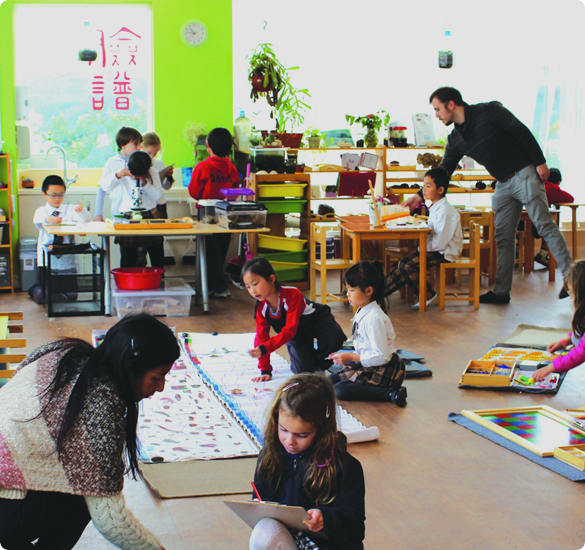Combination of International Baccalaureate (IB) PYP and
the International Montessori Curriculum.
The Lower Primary (ages 6 to 9) and Upper Primary (ages 9-12) programs inspire awe about the world, intrigue children to acquire knowledge, and help them to develop intellectually, emotionally and socially. At Discovery Montessori Academy (DMA) Primary classrooms are designed to support group and individual learning, and are equipped with a rich array of materials that stimulate intellectual curiosity and passion.
 |
Under IB PYP (IB School No. 0523385) and Montessori Curriculum, the following subjects would be taught.
|
Integrated, Interconnected, and Interested
DMA Primary classrooms allow children to respond to lessons eagerly – and often dramatically – when they are able to see and explore connections between everything they are actively learning. Their engagement is reflective of how the world, in general, operates. The best thinkers – CEOs, artists, activists, peace-brokers – are all good at what they do because they see how things are interconnected and interdependent. By seeing the whole, children are better able to understand their role – how they fit in and what their contribution can be.
|
At the beginning of the academic year, DMA teachers ignite curiosity in the children by presenting the “Five Great Lessons.” Each of these lessons is the leaping-off point to key academic areas that must be mastered in the Primary setting. The stories are told with drama, often acted out and supplemented with demonstrations. The essential lessons excite the children and raise more questions than answers. The stories are the catalysts that trigger curiosity and enthusiasm for exciting and important intellectual topics. The result is that children are eager to learn – even topics that might not have personally interested them in earlier studies. The Five Great Lessons vary in detail, complexity and depth for the Upper Primary and the Lower Primary presentations. A critical aspect of the Great Lessons presentations is the unique ability for the story to provide a meaningful context for all of the key lessons that follow – as well as an opportunity to show interrelationships between topics and ideas. Context-setting enables young people to more rapidly understand, categorize, and carry out exercises on the topic materials as they embark on what is arguably one of the most dynamic cognitive acquisition periods in their development as human beings. Key lessons also vary in depth, complexity and type between the Upper and Lower Primary classrooms. *Only schools authorized by the International Baccalaureate can offer any of its four academic programmes: the Primary Years Programme (PYP), the Middle Years Programme (MYP), the Diploma Programme or the IB Career-related Certificate (IBCC). Candidate status gives no guarantee that authorization will be granted. |
 |
| Next |